Key takeaways:
- Engaging in debates fosters critical skills such as critical thinking, communication, empathy, confidence, and resilience.
- Analyzing diverse perspectives deepens understanding and encourages adaptability in discussions.
- Effective argumentation relies on clarity, supported evidence, and anticipating counterarguments to strengthen dialogue.
- Active listening and clear communication are essential practices that enhance personal and professional interactions.
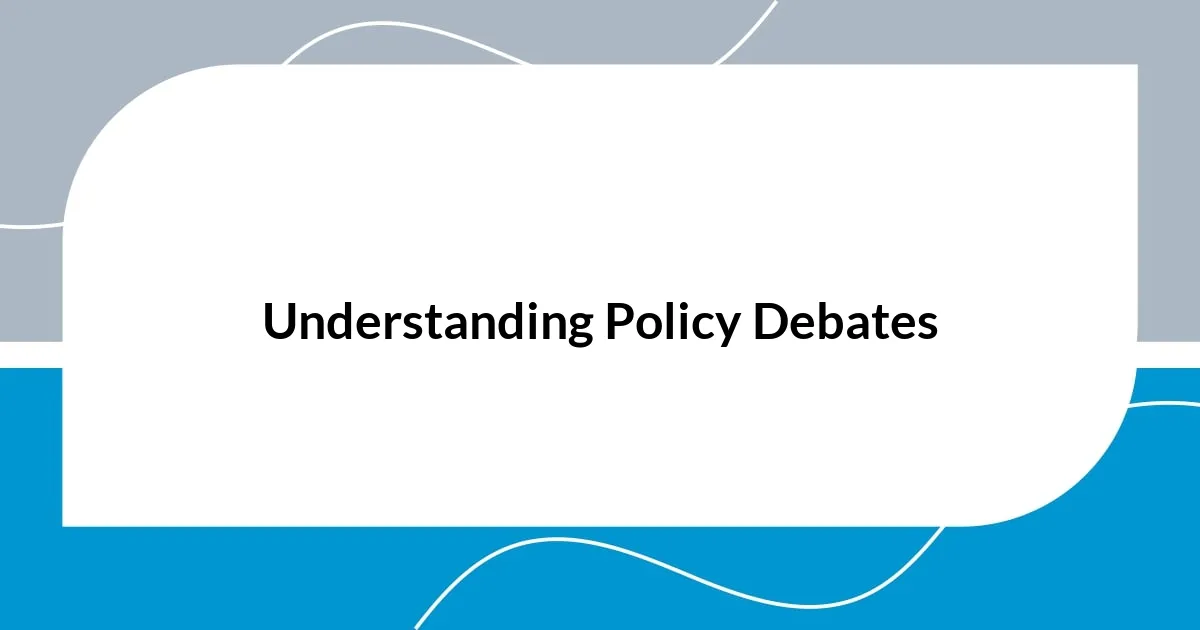
Understanding Policy Debates
Diving into policy debates feels like stepping onto a grand stage where ideas clash and perspectives shift. I remember my first debate vividly; the energy in the room was palpable, and I felt a mix of excitement and anxiety. It was fascinating to see how passionately people argued their positions while also challenging their opponents’ viewpoints. Isn’t it amazing how a single topic can draw out such a wide array of opinions?
As I delved further into this world, I began to appreciate the nuances that drive policy debates. It’s not just about arguing for or against something; it’s about recognizing the values and beliefs underlying each stance. For instance, discussing healthcare can evoke deep personal stories—like when my grandmother battled a chronic illness and the complexities of insurance became painfully clear. How does one put a price tag on human life, after all?
One of the most crucial lessons I’ve taken from these discussions is the importance of listening. In my experiences, I often found myself caught up in the rush to share my opinion, but the true essence of understanding lies in absorbing others’ arguments. Have you ever noticed how a simple question can lead to deeper revelations? This back-and-forth exchange enriches the dialogue and often leads to unexpected insights that challenge preconceived notions.
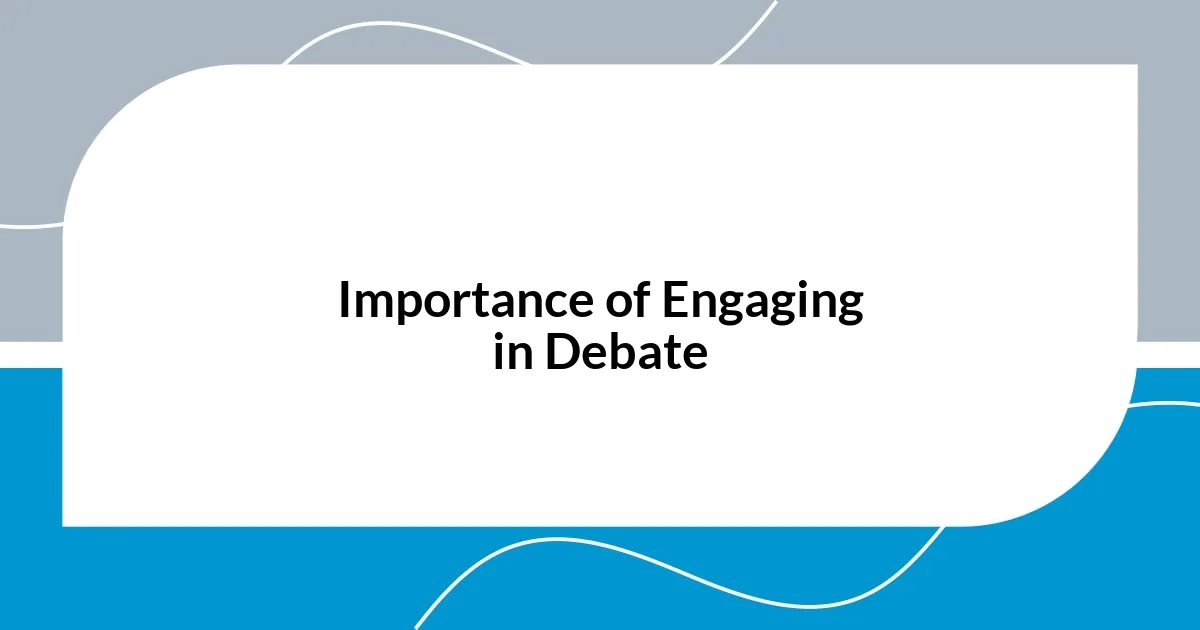
Importance of Engaging in Debate
Engaging in debate is more than just defending a position; it’s a powerful opportunity for personal growth. During my first formal debate, I was surprised by how much I learned from the opposing side. I recall a moment when my opponent presented a compelling argument that made me rethink my perspective on environmental policies. It was uncomfortable yet exhilarating, opening my mind to new ideas and approaches.
Here are a few reasons why engaging in debate is vital:
- Critical Thinking Skills: It challenges you to analyze and evaluate different viewpoints, honing your ability to reason effectively.
- Communication Skills: You’ll learn to articulate your thoughts clearly and persuasively, an invaluable skill in any context.
- Empathy Development: Engaging with differing opinions fosters understanding and compassion for others’ experiences and beliefs.
- Confidence Building: The experience of defending your ideas in a public forum can significantly boost your self-assurance.
- Networking Opportunities: Debates often bring together a diverse group of individuals, allowing you to connect with like-minded peers and engage in meaningful discussions.
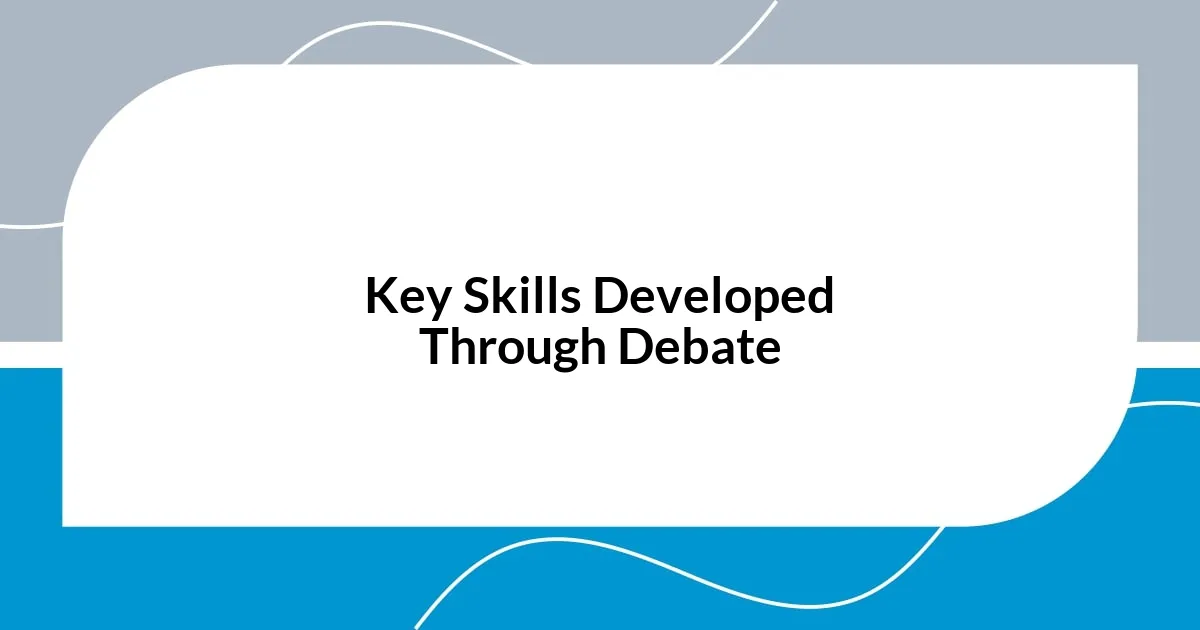
Key Skills Developed Through Debate
Debating develops crucial skills that transcend the academic realm. For instance, I noticed how my ability to think on my feet improved dramatically. During one debate, I was caught off-guard by an unexpected counterargument. It forced me to recalibrate my strategy in real-time, a skill that’s proven invaluable in everyday life, whether in meetings or casual discussions. The thrill of quick thinking can’t be underestimated; it’s like a mental workout that sharpens your cognitive agility.
Moreover, the exposure to diverse viewpoints has enriched my understanding of various issues. I’ve often reflected on how these discussions stretch beyond the boundaries of argumentation. One memorable instance was when I debated education reform. Listening to my team’s contrasting experiences revealed how personal stories impact policy. Connecting emotionally not only strengthens your argument but also humanizes the discussion, making it less about winning and more about understanding.
Lastly, one of the most profound skills I’ve developed through debate is resilience. This isn’t just about defending your viewpoint; it’s about handling criticism gracefully. I still remember the sting of a critiqued point in a national debate. My heart raced, but instead of folding, I learned to embrace feedback and use it to fortify my stance. That experience taught me that every setback is an opportunity for growth, a lesson that transcends debate and speaks to life’s journey.
| Key Skills | Description |
|---|---|
| Critical Thinking | Enhances the ability to analyze and evaluate arguments effectively. |
| Communication | Improves clarity and persuasiveness in articulating thoughts. |
| Empathy | Fosters understanding and compassion for differing opinions. |
| Confidence | Strengthens self-assurance through public defense of ideas. |
| Resilience | Builds the capacity to handle criticism and learn from feedback. |
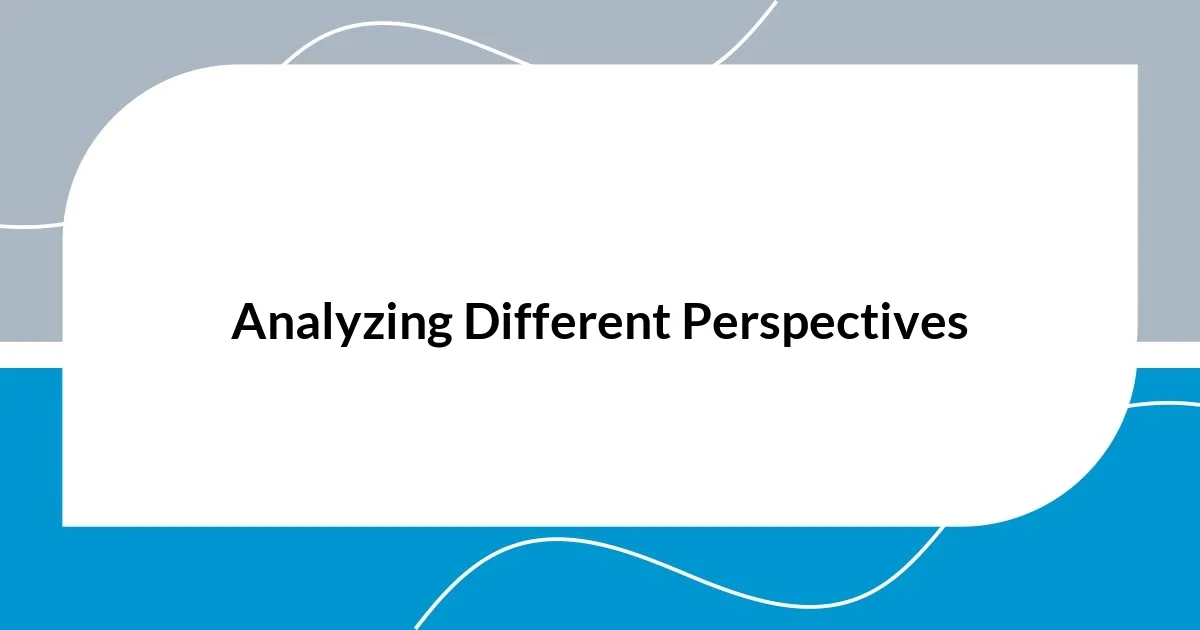
Analyzing Different Perspectives
Engaging with different perspectives in debates often uncovers insights that you might not have considered otherwise. I remember sitting across from a participant who had a deeply personal connection to the healthcare policy we were debating. Hearing her passionate story about a family member’s struggles with access to care made me realize the human impact behind the statistics. Have you ever felt that jolt when someone’s experience reshapes your understanding? It’s moments like these that remind me the importance of stepping outside my own beliefs to truly grasp the nuances of a topic.
Looking back, I can see how analyzing diverse viewpoints has not only enriched my debate skills but also my everyday conversations. During one memorable round, I was challenged on my stance about climate change measures by a peer who was an environmental science major. His factual rebuttals made me rethink my approach, and I found myself asking questions instead of solely defending my position. This shift from a defensive to an inquisitive mindset felt liberating. Isn’t it fascinating how curiosity can deepen our connections and broaden our understanding?
One of the biggest lessons I’ve taken from analyzing different perspectives is the realization that it’s okay to change your mind. There was a debate where I initially held a rigid view on immigration policy. However, as I processed the arguments presented by my opponents, I started to see the complexities beyond just numbers and policies. That transformation felt like shedding a layer of ignorance, and I couldn’t help but wonder—what personal biases might we unknowingly cling to? By embracing this always-evolving nature of our beliefs, we cultivate a richer, more informed worldview.
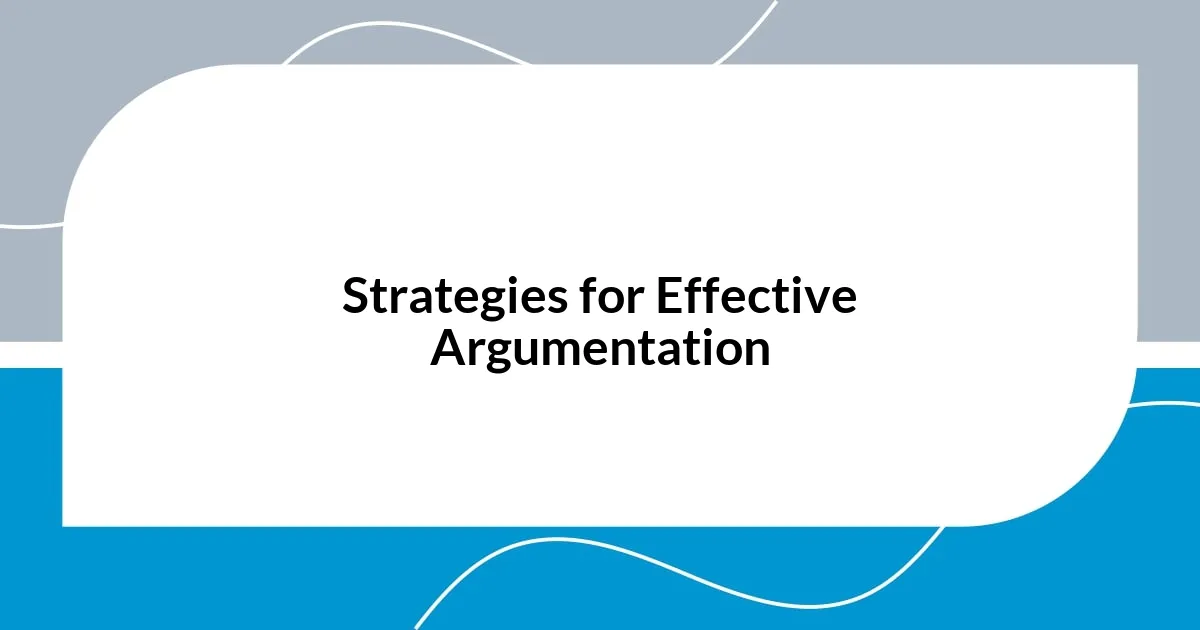
Strategies for Effective Argumentation
Effective argumentation hinges on clarity and structure. Whenever I crafted my arguments, I learned the value of a clear thesis statement. During a debate on healthcare reform, I made sure my main point was straightforward: access to care is a human right. This focus helped my audience understand my stance right from the start. Have you ever tried to follow a convoluted argument? It’s exhausting! When your main message is crystal clear, it’s easier for others to follow along and engage with your viewpoint.
Another essential strategy I discovered is the power of evidence. In one heated debate about climate policy, I relied heavily on reputable studies and statistics. This not only bolstered my argument but also made it difficult for opponents to dismiss my points. I remember one of my teammates saying, “Facts are like a sturdy foundation; without them, your argument can crumble.” It struck me then how crucial it is to back up assertions with solid proof. Have you noticed how much more convincing a well-supported claim can be compared to mere opinion?
Lastly, I can’t emphasize enough the importance of anticipating counterarguments. It’s almost like having a cheat sheet for the debate! During a discussion on education policy, I took time to consider opposing views before the round began. This preparation allowed me to address concerns head-on and show respect for differing opinions. Don’t you think being prepared for challenges not only strengthens your position but also makes the dialogue more constructive? By viewing argumentation as a collaborative exchange rather than a battle, we cultivate a healthier discourse and possibly even find common ground.
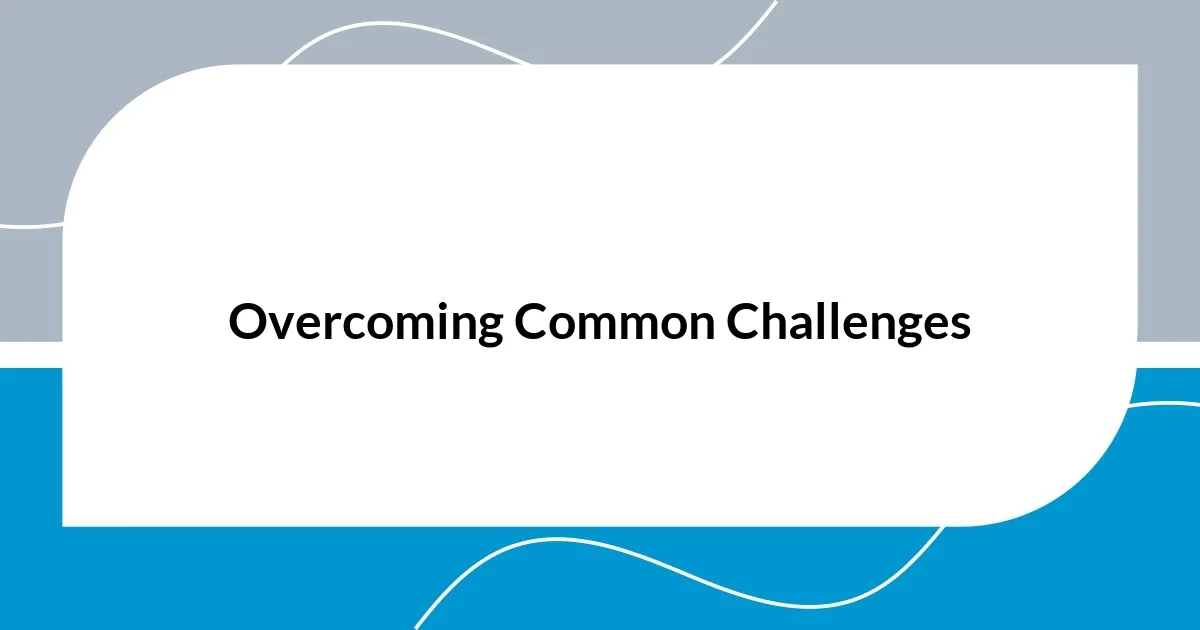
Overcoming Common Challenges
Hurdles in debates can sometimes feel daunting, especially when emotions run high. I recall a particularly heated discussion about social justice where my passion for the topic started to cloud my judgment. Instead of contributing meaningfully, I found myself reacting defensively. Taking a step back to breathe and remind myself of the core objective helped me regain my composure. Isn’t it interesting how our emotions can take the wheel, steering us away from productive dialogue?
Navigating opposing views can be another challenge. I once faced an opponent whose arguments were not only compelling but structured in a way that made me second-guess my own stance on economic policy. Instead of shutting down, I chose to listen intently and jot down key points. This shift not only helped me appreciate the complexity of the issue but also turned a potentially adversarial moment into a collaborative learning experience. Have you ever found yourself in a similar situation where listening led to deeper insights?
Finally, the fear of failure can loom large in debates. I remember stepping up to address a room full of seasoned debaters, my heart racing as I felt the weight of expectation. In that moment, I learned that embracing vulnerability could actually be a strength. By openly acknowledging my nerves and sharing a personal story about why the topic mattered to me, I connected more deeply with the audience. Don’t you think showing our authentic selves can create stronger bonds and lead to more meaningful exchanges?
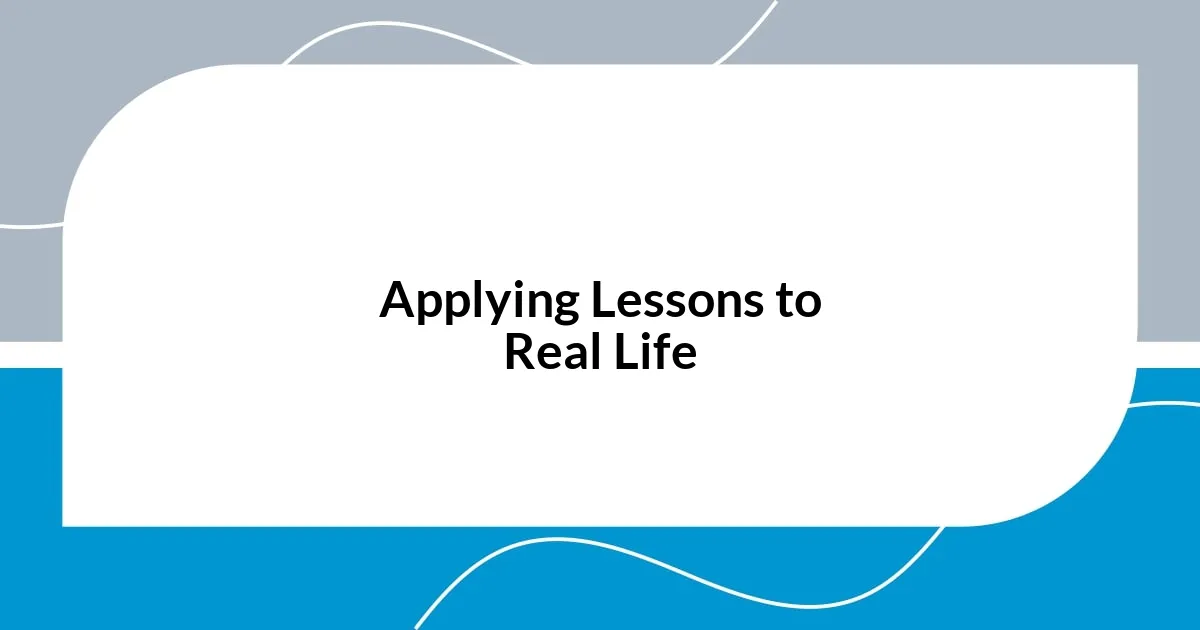
Applying Lessons to Real Life
One lesson I’ve carried into real life is the value of active listening. I remember a time during a community meeting about neighborhood improvements when I intentionally set aside my own ideas to fully absorb the perspectives of others. This not only enriched my understanding but also fostered trust among attendees. Have you found that truly listening often leads to revelations that can reshape your viewpoint? It’s a simple yet powerful practice that enhances both personal and professional interactions.
Another significant takeaway is the need for adaptability. I learned this during a debate on renewable energy. One of my teammates proposed an unexpected counterpoint that challenged our entire stance, and instead of resisting, I decided to explore this new direction. It opened a dialogue that led us to a more nuanced understanding of the complexities involved. Isn’t it interesting how embracing unexpected shifts can lead to growth and better solutions?
Finally, I’ve realized that clear communication isn’t just for debates; it applies to daily life too. I once mishandled a situation at work because I failed to articulate my ideas effectively. The misunderstanding caused unnecessary friction among colleagues, and it dawned on me how crucial it is to convey thoughts concisely. Have you ever found yourself in a similar predicament where a lack of clarity created confusion? From that experience, I’ve learned that ensuring everyone is on the same page can make collaboration so much more enjoyable and productive.